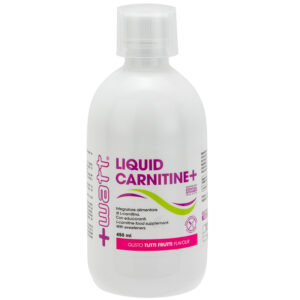L-Carnitine
Carnitine is a naturally occurring molecule in the human body and in foods of animal origin. Its biological role is of primary importance as it transports fatty acids into the mitochondria, which are the “energy centers” of our cells. Only within the mitochondria fatty acids can be degraded in various stages with the formation of energy. Carnitine therefore plays a fundamental and non-replaceable role in the body, in particular in lipid catabolism (lipolysis). In fact, its deficit due to genetic defects leads to a real disease, the systemic carnitine deficiency, in which the metabolism of fats is altered.
Studies on humans have shown that an integration of carnitine promotes, during a very intense or long-lasting exercise, the conversion of fats into energy (Natali et al, Metabolism, 1993).
A study has shown that the intake of 3 g of L-carnitine 40 minutes before aerobic exercise and short anaerobic exercise boosts the use of lipid reserves as a source of energy, thus disfavouring carbohydrates (Natali et al, Metabolism, 1993).
The greater oxidation of fats results in an enhanced availability of expendable energy for exercise, as highlighted by several studies, an increase in VO2max (that is, the maximum volume of oxygen that can be consumed per unit of time to contract the muscles) which results in an increase in the aerobic threshold and therefore in an improvement in high intensity performance (Hetlelid et al, BMJ Open Sport Exerc Med, 2015).
+Watt Advice
Recommended use: take 1 gram of L-carnitine per day, preferably on an empty stomach.




